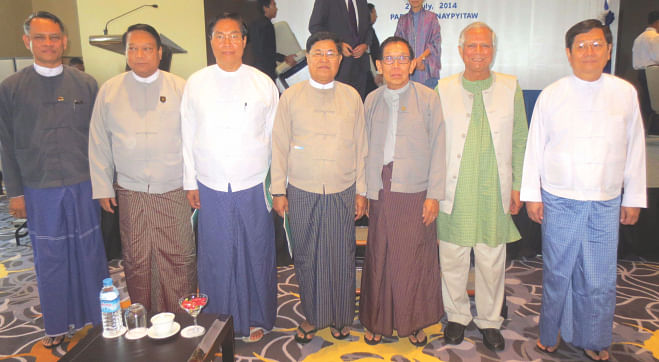Social business shows way of development in Myanmar
Social business shows way of development in Myanmar
Yunus discusses his concept with top ministers of Southeast Asian nation

Nobel laureate Prof Muhammad Yunus discussed the role of social business in the development of Myanmar with the country's ministers, senior government officials and members of parliament on the final day of his three-day visit there.
He was received at the conference venue by Myanmar's two Union Ministers U Tin Naing Thein and U Soe Thein, who are referred to as “super ministers” as each of them oversees five or six ministries and are based in the president's office.
Naing Thein had been a retired brigadier general in the Myanmar army and a former commerce minister. A retired Vice Admiral, Soe Thein had previously served Myanmar Navy as the Commander in Chief.
The meeting was attended by more than 100 senior representatives of various ministries, including national planning and economy, finance and agriculture. Representatives from NLD, the leading opposition party led by Aung San Suu Kyi, were also present, Yunus Centre in Dhaka said in a statement yesterday.
Supervising Minister U Soe Thein gave the opening speech describing the development policies undertaken by the Myanmar government.
Microcredit inspired by Grameen Bank practices has been given the highest importance in the development strategy of Myanmar, he said, adding that 197 firms had been given licences to operate microfinance organisations.
The largest microfinance institution operating in Myanmar is the programme implemented by PACT, an international NGO.
The programme was originally set up and run by Grameen Trust for six years from 1997 in the delta zone, and currently it reached 700,000 families with microcredit in Myanmar.
Yunus thanked the minister for the steps the government took for the development of the poor.
He described his journey in initiating microcredit and how over the years he had created companies and entities to tackle different problems faced by the poor.
As Myanmar is opening up, it has the opportunity to pursue the right track of development avoiding the mistakes of other countries, he said.
A lot of investment capital and donor money were coming into Myanmar, he said, adding that the country could make it work for the people at the bottom rather than have all the surplus taken away from extractive industries and other sectors to foreign lands or to benefit just a few people at the top.
He recounted the experience in Bangladesh with microcredit and social business, and especially talked about the importance of creating selfless businesses where profits of successful business are ploughed back into the local communities.
He said social business was a non-dividend company to solve human problems and gave examples of effective social businesses and social business funds being implemented in Bangladesh and around the world.
He urged the government representatives to allow the young people to lead the way in the creation of a new Myanmar.
U Win Htein, a member of parliament from NLD, said Myanmar has problems along its borders with Bangladesh. He said his party is committed to protect human rights of all people.
He wanted to know the views of Professor Yunus on this problem.
Professor Yunus said the relationship between the people of these two neighbouring countries with centuries of historical relationship should be one of deep friendship.
He said all people have the right to live in peace and security wherever they live.
He applauded the lawmaker and his party for upholding human rights of all people living within the boundaries of his country.
In Yangon, Yunus addressed a group of young Myanmar students, activists and civil society representatives and urged them not to wait for the elders to show them the way, rather dream up the world they want to create for themselves, and to get working on that immediately.
He also urged them to break down walls among groups of people prejudiced against each other, on the basis of religion, place of birth or ethnic identity.
The Nobel laureate wanted the youth of Myanmar to reach out to the young people all around the world, particularly of the neighbouring countries. He invited them all to visit Bangladesh to get to know their neighbour and its young people.